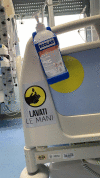A nudge intervention to improve hand hygiene compliance in the hospital
- PMID: 35852676
- PMCID: PMC9294805
- DOI: 10.1007/s11739-022-03024-7
A nudge intervention to improve hand hygiene compliance in the hospital
Abstract
Hand hygiene among professionals plays a crucial role in preventing healthcare-associated infections, yet poor compliance in hospital settings remains a lasting reason for concern. Nudge theory is an innovative approach to behavioral change first developed in economics and cognitive psychology, and recently spread and discussed in clinical medicine. To assess a combined nudge intervention (localized dispensers, visual reminders, and gain-framed posters) to promote hand hygiene compliance among hospital personnel. A quasi-experimental study including a pre-intervention phase and a post-intervention phase (9 + 9 consecutive months) with 117 professionals overall from three wards in a 350-bed general city hospital. Hand hygiene compliance was measured using direct observations by trained personnel and measurement of alcohol-based hand-rub consumption. Levels of hand hygiene compliance were low in the pre-intervention phase: 11.44% of hand hygiene opportunities prescribed were fulfilled overall. We observed a statistically significant effect of the nudge intervention with an increase to 18.71% (p < 0.001) in the post-intervention phase. Improvement was observed in all experimental settings (the three hospital wards). A statistical comparison across three subsequent periods of the post-intervention phase revealed no significant decay of the effect. An assessment of the collected data on alcohol-based hand-rub consumption indirectly confirms the main result in all experimental settings. Behavioral outcomes concerning hand hygiene in the hospital are indeed affected by contextual, nudging factors to a significant extent. If properly devised, nudging measures can provide a sustainable contribution to increase hand hygiene compliance in a hospital setting.
Keywords: Decision-making; Hand hygiene; Infection prevention; Nudge.
© 2022. The Author(s), under exclusive licence to Società Italiana di Medicina Interna (SIMI).
Conflict of interest statement
The authors have no conflicts of interest to report.
Figures
References
-
- European Centre for Disease Prevention and Control (ECDC) Annual report of the European Antimicrobial Resistance Surveillance Network (EARS-Net) Stockholm: ECDC; 2014.
-
- Pittet D, Hugonnet S, Harbarth S, Mourouga P, Sauvan V, Touveneau S, Perneger TV. Effectiveness of a hospital-wide programme to improve compliance with hand hygiene. Infect Control Programme Lancet. 2000;356(9238):1307–1312. - PubMed
MeSH terms
LinkOut - more resources
Full Text Sources
Medical



